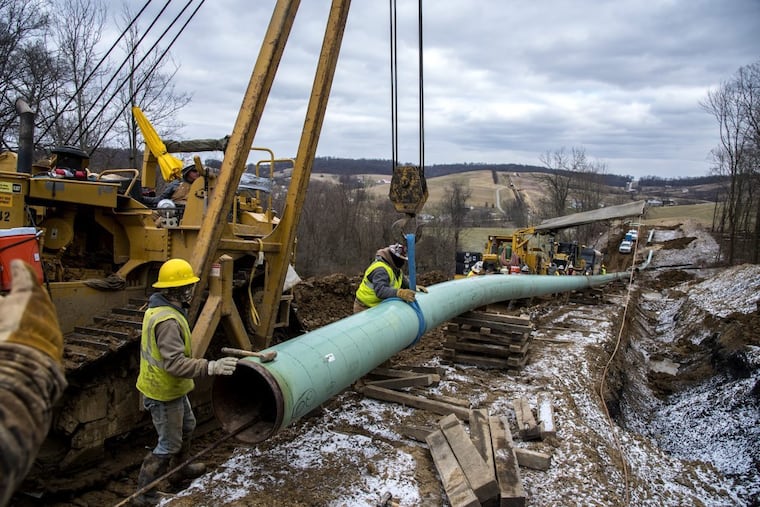It’s time for Pennsylvania to stop subsidizing fossil fuels and climate change | Opinion
The state gives the fracking industry billions of dollars, and it gives back polluted water, sinkholes, and explosions.

Two billion dollars in subsidies — that’s billion with a B. That’s how much Pennsylvania doled out to the gas industry in fiscal year 2019 alone. Yet the industry and the lawmakers it supports are clamoring for still more favorable treatment. State lawmakers must stop using taxpayer money to subsidize this dying and dirty industry – or voters must elect new leaders who will start investing in a cleaner future for the commonwealth.
Last month, the Pennsylvania General Assembly held a hearing titled “Consumer & Economic Impacts of Failing to Invest in PA’s Natural Gas Infrastructure.” Lawmakers brought on a series of speakers lamenting the state’s supposed “failure” to invest in fracking, pipelines, and other dirty industrial activities that have catapulted Pennsylvania into among the top climate polluters worldwide.
» READ MORE: Fracking in Pennsylvania used toxic ‘forever chemicals’ as Pa. officials maintain willful ignorance | Editorial
Let’s be clear: This is an absurd premise for a public hearing. Pennsylvania lawmakers have treated the gas industry as their golden child, giving it generous heaps of subsidies at the expense of taxpayers, and carving out exemption after exemption from the laws and regulations by which other industries must comply. Currently, the General Assembly has bills pending that some argue could make it illegal for municipalities to adopt any policies that have “the effect of” restricting the use of gas in buildings (SB 275), roll back environmental protections for the conventional gas industry (HB 1144), and strip the Department of Environmental Protection of its existing authority to adopt programs to control greenhouse gases from the combustion of, in large part, fracked gas (HB 637).
Meanwhile, the industry has done little for Pennsylvanians. The big benefit of the fracking boom was supposed to be jobs. But job growth in the most fracked counties in Pennsylvania was less than half that of the national growth rate of 9.9%; five fracking counties either gained very few jobs or experienced a loss. The number of jobs in the gas industry in Pennsylvania has never been large. Out of 6.3 million employed Pennsylvanians, fewer than 24,000 work in the gas industry. Meanwhile, nearly three times as many Pennsylvanians are employed in the energy-efficiency industry as in the gas industry.
For most Pennsylvanians, the real impact of the gas industry is not wealth or bounty but pollution. It’s illness. It’s bulldozers barreling through their backyards and state forests. It’s seeing their land taken without their consent through eminent domain. It’s their drinking wells polluted. It’s sudden, dangerous sinkholes. It’s the constant worry of a major explosion.
“For most Pennsylvanians, the real impact of the gas industry is not wealth or bounty but pollution.”
At Clean Air Council, we’ve seen these effects firsthand. Desperate homeowners have called us to ask what can be done now that their water well has dried up, or a sinkhole has opened up by their house. We have heard too many stories of people forced to move due to the heavy industrial pollution from gas operations and infrastructure close to their homes.
Pennsylvania’s 43rd Statewide Investigating Grand Jury conducted a two-year investigation and issued a report in June 2020 that presented clear evidence of the same: The gas industry is poorly regulated and controlled in Pennsylvania. More recently, Attorney General Josh Shapiro charged the Mariner East pipelines’ parent company, Energy Transfer, with 48 environmental crimes.
It does not have to be this way. The green economy in Pennsylvania is already flourishing, and it’s poised for significant growth and investment in both the near-term and long-term. The climate crisis demands immediate attention, and renewable energy will be a fundamental part of the solution.
Pennsylvania’s finite reserves of fossil fuels, including fossil gas, are not a solution to the climate crisis. Indeed, continued extraction and burning of gas will produce catastrophic consequences for the health and safety of people statewide. With solar and wind technology now the cheapest way to add electricity in markets around most of the world, and with significant advancements in battery technology and energy storage, investments in renewable energy are unquestionably the best use of commonwealth fiscal resources. Pennsylvania should act now to get ahead of the curve on clean energy. Indeed, to avoid falling even further behind.
Joseph Otis Minott is the executive director and chief counsel of Clean Air Council in Philadelphia.